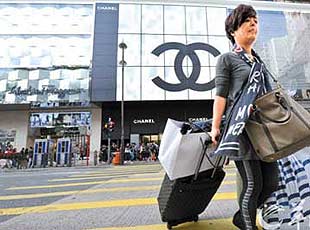Is the shine gone from luxury goods?
China Daily, February 28, 2014 Adjust font size:
Low-key preferred
"Bottega Veneta handbags are getting very popular in China as they are more understated than some other brands with logos all over, and yet the woven strips of soft leather are instantly recognizable. So are Hermes, Ferragamo and MaxMara," Tu noted.
Furman said that American Express has done research on stages of consumption of luxury products and services by nationality.
"What they discovered, which is true universally in the US, Japan, the UK and Europe, are four stages of luxury consumption: acquisitive, inquisitive, authoritative and meditative," said Furman.
"Acquisitive means the bigger the brand, the bigger the logo, the more they can boast about it, the happier they are. That's where China was, and that's where Russia is and moving out of, and was the US in the 1970s," he said.
"Inquisitive is a wake-up call. The customers want to understand the price and value equation," said Furman, "why this is valued at $12,000 and why great things command a premium price. China is moving toward that stage very quickly, much more quickly than any other nation.
"In China, more and more people are moving into the authoritative phrase. They can tell experts what their opinion is and start feeling comfortably knowing what luxury means.
"Meditative is about the experience, the memory of a great product or a service story - the intelligence of being able to say I am in the know, I understand what luxury is. And it's a reward to oneself for having achieved the ability to understand what luxury is and share it with one's family.
"It took the US from the late '70s till the '90s to get to this meditative stage. China is going to be there in the next five to 10 years. The mainland consumers are moving at a record pace that more and more people will get more and more sophisticated faster and faster.
"It's a good sign for luxury products and services. Because if people understand the inherent value of the craft, the thought and the imagination that have gone into a product or a service, if they understand that truly, then price does not matter. They will pay anything," Furman said.
Luxury brands need to have a fundamental understanding of Chinese customers' likes and dislikes, Sun said. "Some argue that it's a buying pattern that Chinese like to show off with logos, but I don't think it's unique to China."
"It's a process by which people move up the food chain in terms of how they view the luxury product and services and how much they are willing to pay for it," Furman agreed. "It's a learning curve."


